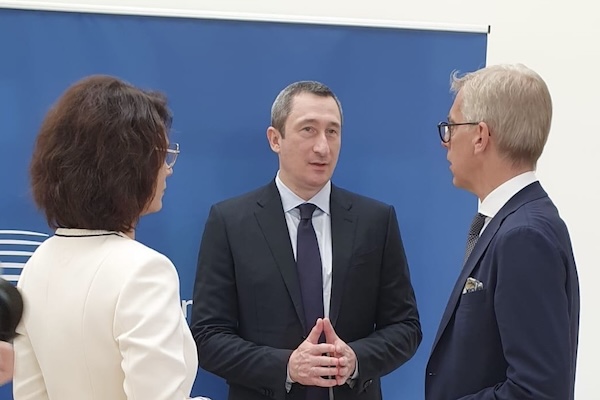 (L-R.) nc; Oleksiy Chernyshov, Deputy Prime Minister of Ukraine; Luxembourg’s Minister for Home Affairs, Léon Gloden;
Credit: MAINT
(L-R.) nc; Oleksiy Chernyshov, Deputy Prime Minister of Ukraine; Luxembourg’s Minister for Home Affairs, Léon Gloden;
Credit: MAINT
On Friday 13 June 2025, Luxembourg’s Minister for Home Affairs, Léon Gloden, participated in the meeting of the Justice and Home Affairs (JHA) Council of the European Union (EU), which took place in Luxembourg.
Luxembourg’s Ministry for Home Affairs reported that the ministers began with an exchange of views with their counterparts from Moldova and Ukraine on the impact of the geopolitical situation on the internal security of the EU. They were then briefed on developments in Syria.
According to the report, the ministers unanimously reached a provisional political agreement to extend temporary protection for people fleeing the Russian war of aggression in Ukraine until 4 March 2027. At the same time, work began to define a common, coordinated and gradual approach to exiting the temporary protection regime.
Regarding internal security, the ministers discussed the new ProtectEU internal security strategy, published on 1 April 2025. During his speech, Minister Gloden welcomed the broad outlines of ProtectEU, calling it a "decisive step towards a high level of security within the EU and the Schengen area." He also reaffirmed the importance Luxembourg places on the fight against organised crime and advocated for strengthening current EU rules on operational police cooperation, calling for a modern legal framework adapted to the realities on the ground. The minister also emphasised the importance of guaranteeing law enforcement agencies legal access to digital data, which has become essential for investigations. He said: "No data means no investigations, no investigations means no crime solving."
During a working lunch, the ministers discussed incentive measures for better cooperation between third countries in relation to readmission. Minister Gloden agreed to use "an effective visa lever when third countries do not cooperate to readmit their own citizens."
The ministry reported that the Council provided an opportunity to review the declaration marking the 40th anniversary of the Schengen Area. It remarked that “Schengen has demonstrated its resilience and the benefits it brings to our society, our economies and our prosperity. Today, in times of geopolitical instability and a changing security landscape, we face complex threats that include foreign manipulation and interference of information, the instrumentalisation of migration and other hybrid activities.”
The ministry also reported that the ministers reaffirmed their determination to jointly address current and future threats using enhanced tools and capabilities and to make Schengen “our strategic and operational asset”. Minister Gloden reiterated that "the Commission must use all means at its disposal, including unannounced visits, to normalise the situation at our internal borders.” He reminded the Commission that, following its complaint, he is awaiting an opinion on the necessity and proportionality of internal border controls. He said: “These controls are contrary to the spirit of the Schengen Area and call into question the fundamental principle of the free movement of persons."
On the sidelines of the JHA Council, Minister Gloden met with Deputy Prime Minister of Ukraine, Oleksiy Chernyshov. He also met with Spanish Interior Minister Fernando, Grande-Marlaska Gómez, to discuss internal border controls and the implementation of the Pact on Migration and Asylum.








